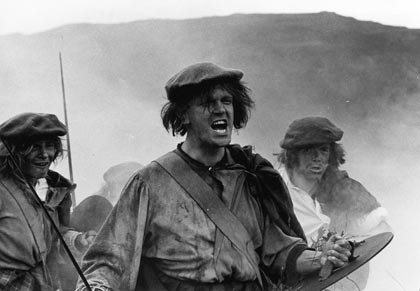
by Alex Coopersmith, opinions editor
The eve of the vote for Scottish independence is upon us, and it presents a good opportunity to look back on the rich history of Scotland and Britain. Though one could settle down with a nice thick book and learn all about James VI of Scotland (James I of England) and the “gunpowder plot” or the centuries of violence between Protestants and Catholics, there exist several more engaging movies about this turbulent relationship — and no, not all of them star Mel Gibson. For an alternative to “Braveheart” on this night, look no further than the 1964 BBC special “Culloden.”
Culloden is a docudrama about the 1746 battle between the Jacobites (who were Scottish highlanders under Prince Charles) and the existing English crown. It was the last pitched battle ever fought on English soil, and signified the end of major resistance to the Crown in Great Britain. The battle can best be described as a slaughter in which the Jacobites, fighting with swords, lost between 1,500-2,000 men, while the British with the help of cannons, tactics and muskets lost only 50.
Though, as in all historical films, the audience likely knows (or can guess) how the film will end, Culloden does a masterful job of showing a hand-filmed 1700s war that wouldn’t look out of place as original content on YouTube. It personalizes the conflict, showing brother fighting against brother, and also delves into the Scottish highland caste system and shows how brutal it was to be a private in the British army.
In addition to being excellent in its historical portrayals, the movie showcases the horrors of war — especially for the Scottish side. The Jacobites introduced are mostly dead within a few minutes. The effectiveness of British cannons and bayonets in slicing down the enemy are ruthlessly perfect. It also shows how the British army hunted down all remaining “rebels” after the battle was over and thus eliminated a vast part of Scottish culture.
After the battle, the British army proceeds to butcher the survivors, and Parliament passes laws banning Scottish highland clothing like the kilt and forbidding the playing of the bagpipes. While those laws no longer exist, the distrust they planted has lasted for a long time, which can help American viewers understand Scottish cultural reasons for seeking independence.
Those opposed to Scottish independence have rightful worries about the future of the pound, the stability of the European Union and the existence of some of the United Kingdom’s nuclear weapons within an area that may not belong to it in two days. However, there is unanimous consensus on the fact that Scotland and Britain don’t exactly have the perfect past. So tomorrow sit back, relax, watch the poll numbers of the referendum come in from Thursday afternoon to Friday morning (in America) and check out this fantastic movie about a monumental event in the history of Scotland and Britain.
Photo from the BBC.

